A Glimpse into NHBP’s Mnomen {Wild Rice} Camp and Fall Ceremonies
Written by Leslie McLove | Photos by NHBP Tribal Member and Photographer Johnathon Moulds
“Wild Rice Camp was a prime example of the importance of Indigenous foodways in action. Food is what brings people together, and through that sustenance, our peoples gain sovereignty and tighten the bonds between individuals and nations.”
Kain Eller (Lummi/Upper Skagit/Nooksack Nation(s), 2023 Rice Camp participant from Indiana University Bloomington
As the morning sunbeams peeked through the clouds on Saturday, September 9, participants ascended upon The Pine Creek Indian Reservation for Wild Rice Camp. Activities for 2023 were held near the Pow Wow Grounds. Sponsored by the Culture Department, this two-day, hands-on event offered an opportunity to learn the traditions of Mnomen {Wild Rice} harvesting and finishing.
Mnomen is deeply entwined with the NHBP people. Harvesting Mnomen is one of the essential lifeways our Ancestors practiced to survive. It was a great sustenance source and a staple in their diets. To many, food is a language, a bond, a bridge between generations. This grain symbolizes Neshnabék Culture, our history, and our spiritual connection to the land. It is through the revitalization of Native foodways like this that we honor our heritage.
Unlike its northern cousin, Wild Lake Rice, Wild River Rice is the southern variety found in waterways near the Reservation. A bold and robust plant that, with the proper conditions, can reach over 12 feet tall above the water.
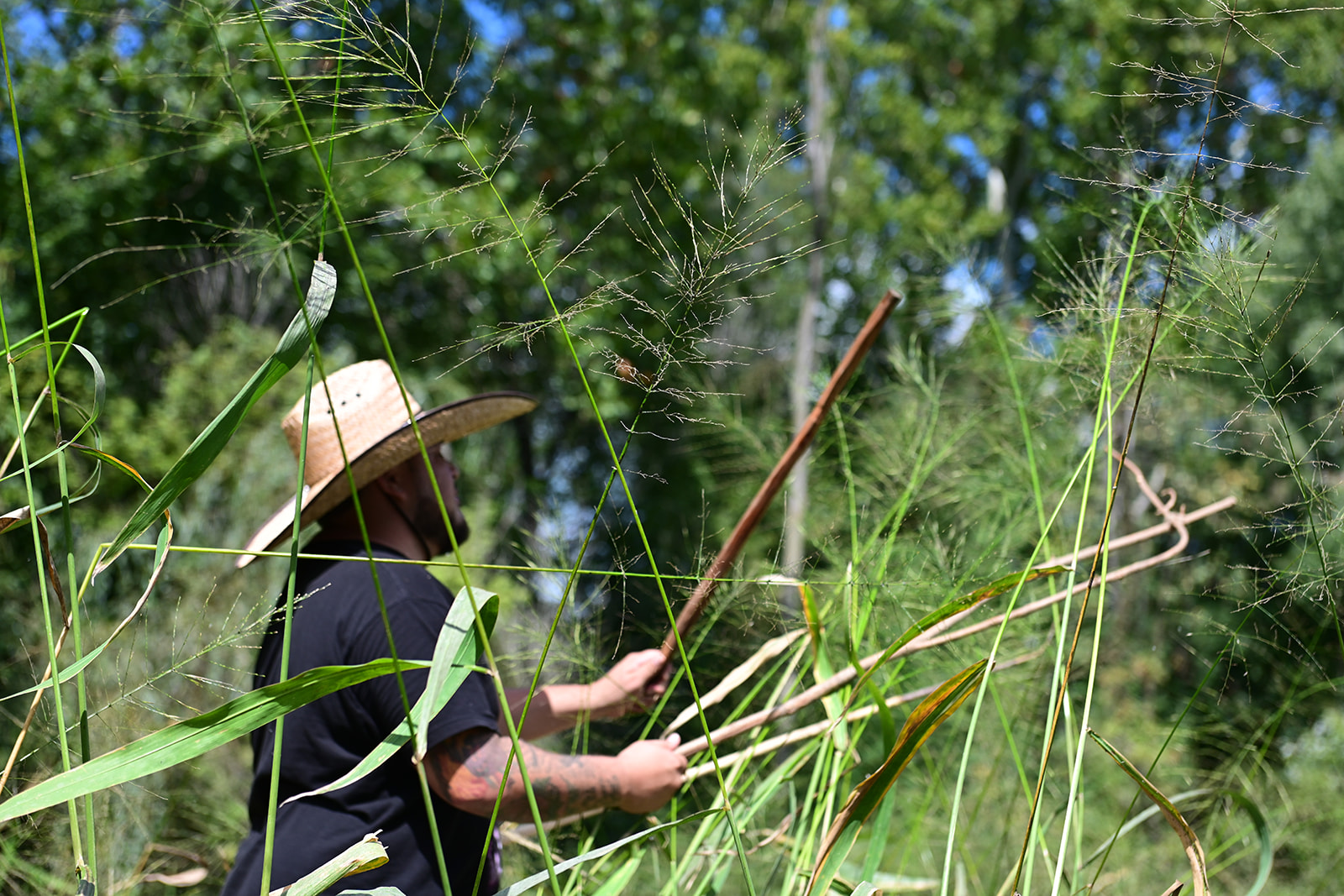
NHBP hosts this annual harvesting event to promote the importance of practicing the traditional method of Wild Ricing. It’s necessary to continue these traditions and to teach the significance of embracing and respecting the food the land has gifted us.
“We harvest Mnomen in the fall during our fall ceremonies. Fall ceremonies are about harvesting our Medicines after a long summer of growing. We also harvest foods in preparation for the coming winter months,” said NHBP Culture Specialist Kevin Harris II. “The ceremonies are important to keep our traditions alive. The plants and food we collect are gifts from the Creator, and the annual ceremonies are ways we give back in the traditional way. Everything we do as Anishinaabe is ceremony.”
The event saw a diverse assembly of eager learners, driven by a thirst for cultural knowledge. Among them were NHBP Tribal Members and other federally recognized tribal citizens. Also included was a group from Indiana University Bloomington, who journeyed more than four hours to partake in the Wild Rice harvest celebration.
The experience left everyone not only enriched but also forging new friendships.
“Wild Rice camp was an amazing experience for our students, faculty and staff,” said the First Nations Educational and Cultural Center Director at Indiana University Bloomington, Sherene Goatson Ing (Diné). “We come from different tribal nations scattered across the country, and many of us miss our Native communities. We enjoyed learning more about your harvest celebration, participating in ceremony and creating new friendships along the way.”
Also on-hand to offer their cultural teachings and share their Wild Rice harvesting expertise were Ojibwe agriculturalists and founders of Dynamite Hill Farms, Jerry Jondreau (Keweenaw Bay Indian Community) and Katy Bresette (Red Cliff Band of Lake Superior Chippewa). Their wisdom, rooted in native food sovereignty, intertwined seamlessly with the eager ears of those who traveled miles to learn. The two helped the Culture Department lead workshops and teachings throughout the weekend. They also brought down a bundle of Wild Lake Rice from the Northern Peninsula so participants could see the difference between the two grains.
Each day dawned with a Sacred Fire build and Sunrise Ceremony, followed by a morning meal to start the day off in a good way. The resonant sounds of the Ribbon Town Drum filled the air, underscoring the sense of unity and Community. After breakfast, participants were divided into groups, some taking to the river in canoes to collect Mnomen, while others stayed at the camp, engaging in learning activities and preparing the food for the feasts at day’s end.
At the heart of this event lies the act of harvesting Mnomen. It is a profound acknowledgment of the gifts bestowed upon us by the Creator, a Dance of reciprocity where we take only what we need and give back in the traditional way. Each Rice grain collected carried with it the weight of centuries of wisdom, a reminder that our actions echo through time.
The process of collecting Mnomen is an art in itself, involving careful maneuvering of canoes among the Wild Rice plants, bending the grain heads, and tapping the plants with the ricing sticks to release the seeds into the canoe.
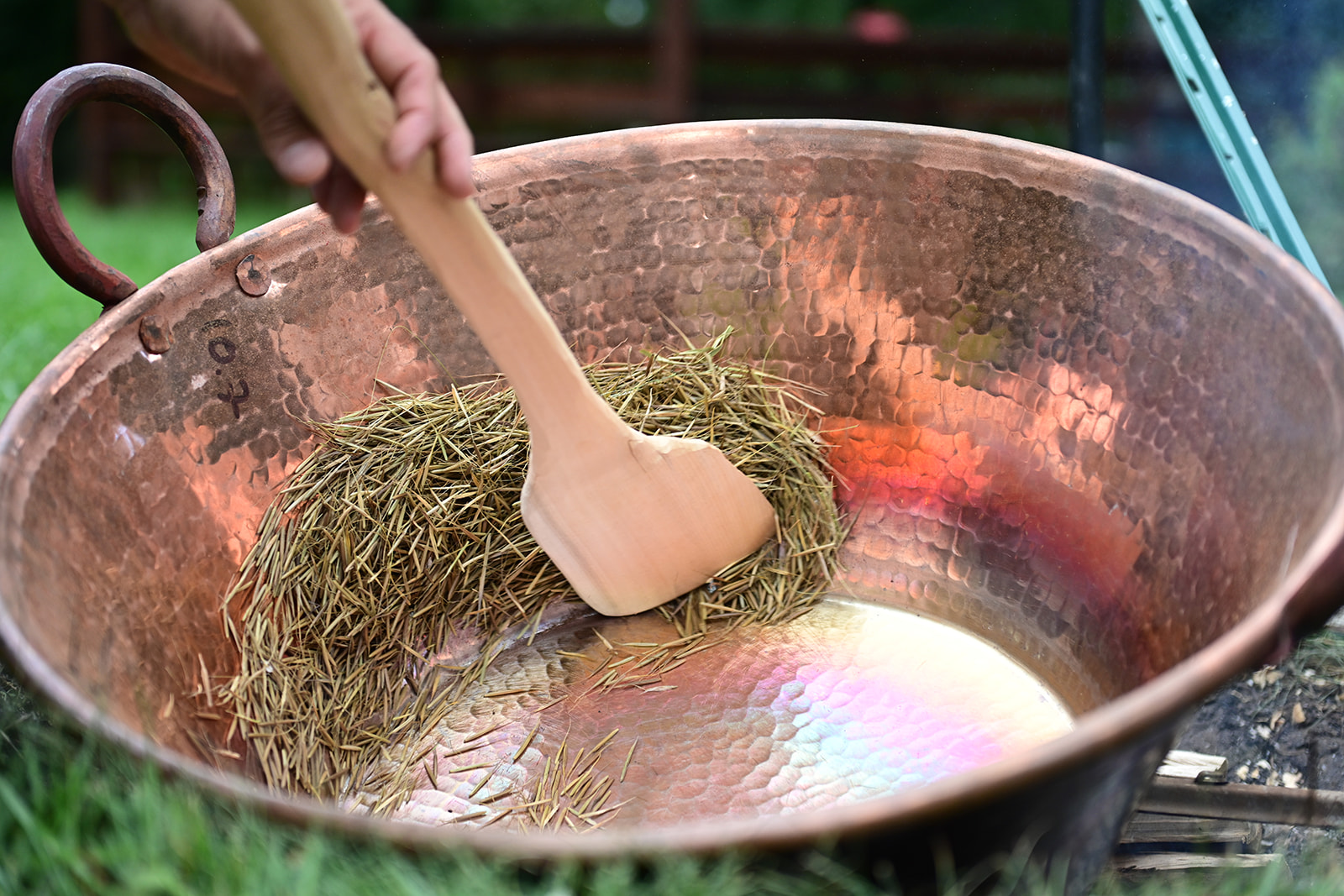
Once collected, the Mnomen was spread out to dry, followed by parching, Dancing, winnowing and sorting. The parching process involved roasting the Rice in a copper kettle with a Cedar paddle.
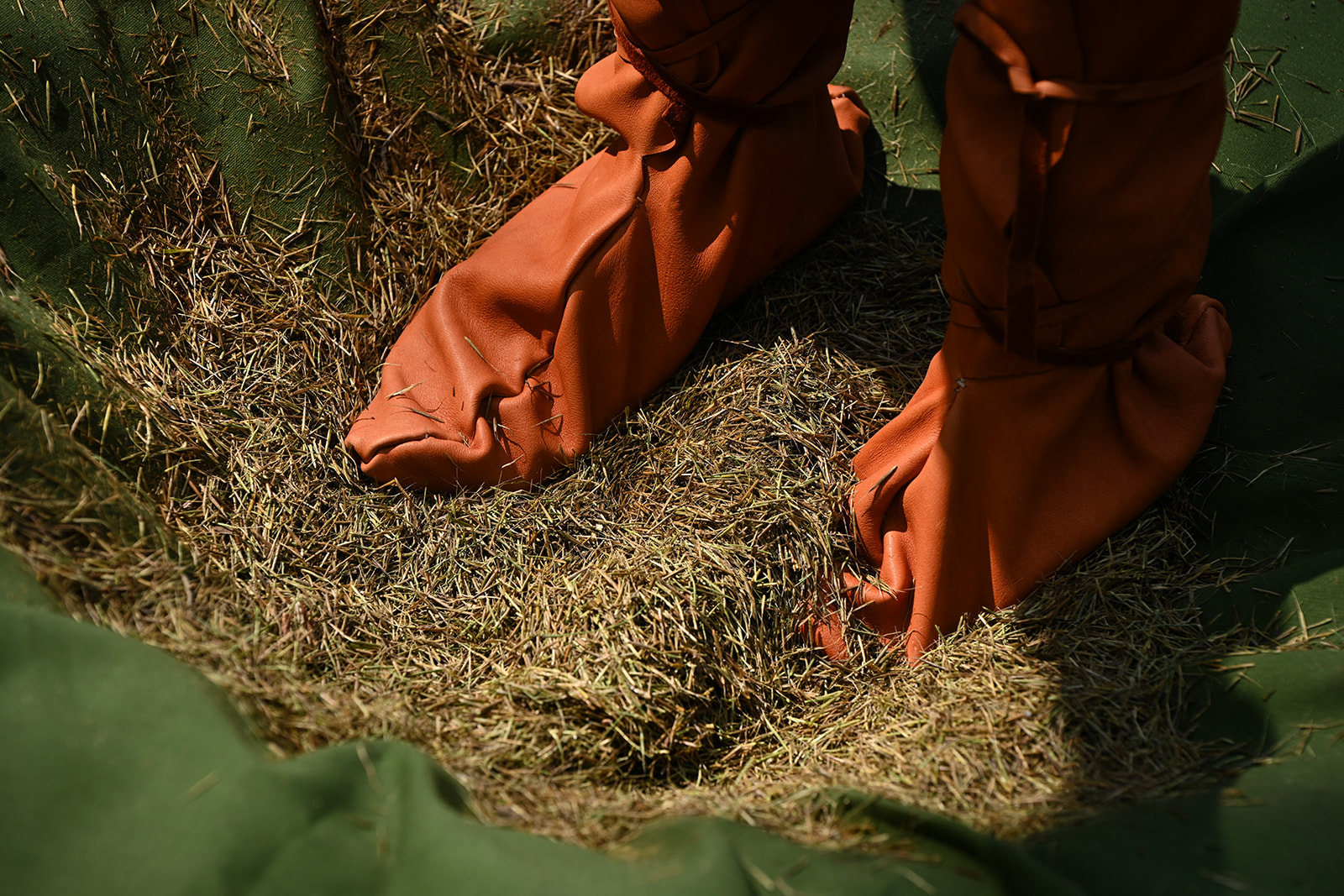
The Dancing, performed with specialized moccasins, separated the hulls from the Mnomen, and the winnowing baskets played a pivotal role in removing the chaff.
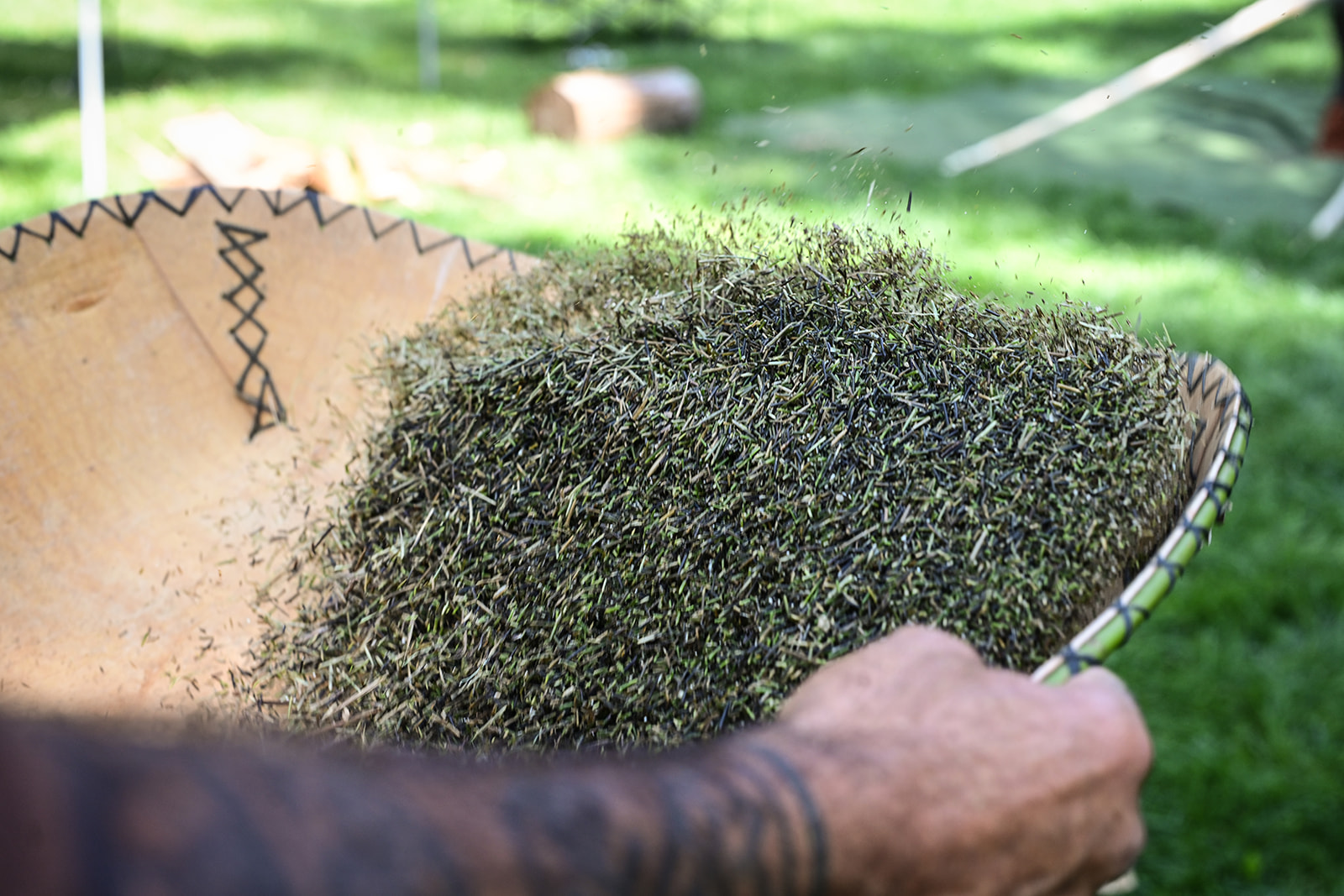
This year’s Rice Camp, a convergence of knowledge and reverence, was more than a mere event—it was a celebration of indigenous lifeways in real-time. As the canoes glided on the water, the spirit of the Anishinaabe people came alive, resonating with the teachings of our ancestors.
The event exemplified the sacred balance between giving and receiving. It was a convergence of the traditions of harvesting Wild Rice and the profound teachings of the Seven Grandfathers.
Outside of harvesting the Mnomen, participants also had the opportunity to participate in a moccasin-making workshop and a Birchbark Wild Rice winnowing basket-making workshop taught by Bresette.
To close out each day, participants feasted on traditional dishes. Options such as Bison Pozole with purple and white hominy, Wild Rice salad, corn, smoked salmon, corn husk wraps filled with buffalo, salmon or venison, sweetmeat and a cucumber and tomato salad fresh from the garden, which was provided by NHBP Tribal Member and Food Sovereignty Coordinator Nickole Keith and Tribal Members Mariesha Keith, Dorie Rios, Journi Wilson and Dyami Harris.
This year’s event offered an opportunity to learn, share and work together. Stories were shared, and wisdom was passed from one generation to another. It marked an intergenerational effort to breathe life into Anishinaabe Culture and keep the flame of our traditional teachings alive. This passing of knowledge is crucial for cultural revitalization, igniting a connection to Anishinaabe foodways in the hearts of future generations.
One of the keys to cultural revitalization is the importance of building relationships and knowledge over time by passing this wisdom on. It’s about preserving traditional practices, resuscitating traditions, and revitalizing cultural heritage.
The 2023 Mnomen {Wild Rice} & Fall Ceremonies became more than an event; it became a vessel of cultural rejuvenation. It was the embodiment of our shared journey, reminding us that our traditions, like the Wild River Rice, are robust, resilient, and deeply rooted in the soul of our people.
Many participants left this gathering, their hearts brimming with gratitude, for they had not just harvested Mnomen; they harvested the spirit of our ancestors, ensuring that their wisdom and legacy continue to thrive.
View the 2023 Mnomen {Wild Rice} & Fall Ceremonies photo gallery HERE.

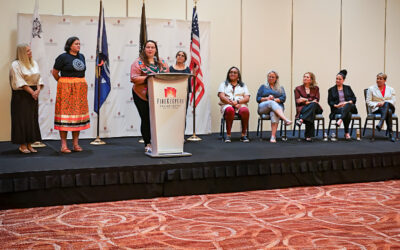


0 Comments